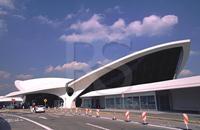Trinidad court rules to extradite three suspects in alleged JFK attack to U.S.
The court ordered Monday three men extradited to the U.S. to face charges in an alleged attack of New York's John F. Kennedy International Airport.

Chief Magistrate Sherman McNicolls rejected without comment a defense argument that the men could not be extradited on conspiracy charges under Trinidadian law.
Richard Clarke-Wills, a lawyer for defendant Abdel Nur, said he would appeal the ruling to the country's High Court and a decision should take at least six weeks.
Attorney Rajiv Persad, who represents defendants Kareem Ibrahim and Abdul Kadir, said he had to speak to the men before deciding whether to pursue an appeal.
Clarke-Wills said earlier that he had expected to lose the first round in the extradition case, and insisted that a confidential U.S. government informant entrapped the men into plotting to attack the New York airport.
"If it were not for the intervention of this source you would not have these three men before the courts," Clarke-Wills said before the ruling. "They had no terrorist aspirations or ideals ... I have no doubt whatsoever this is a clear case of entrapment."
Two of the suspects scoffed at the accusations before the hearing.
Nur and Ibrahim spoke briefly to The Associated Press as police escorted them with Kadir into the court in downtown Port-of-Spain for the extradition hearing.
"It's false," Nur told AP. "It's a setup. It's a big setup by the drug dealers."
Nur, who is from Guyana, was apparently referring to the confidential informant, a convicted drug dealer who taped conversations in which the suspects allegedly plotted to blow up a fuel pipeline that runs through residential neighborhoods and supplies the airport.
He underscored his point with a white T-shirt that proclaimed "No Extradition by Entrapment" in black letters on the back.
Ibrahim, who is from Trinidad, said of the allegations: "It's a movie."
The third suspect, Abdul Kadir, smiled but said nothing as he entered the Caribbean country's colonial Magistrate's Court, which was guarded by about a half a dozen police.
Their lawyers argued the men could not be extradited for conspiracy under Trinidadian law - a claim challenged by Douglas Mendes, a lawyer appointed to represent the U.S.
Mendes declined to comment on the defense claims that the men had been entrapped.
The three men were arrested in Trinidad in June, when U.S. authorities announced they were part of a cell led by a U.S. citizen Russell Defreitas, a Guyana native who worked as a cargo handler at the airport until 1995. Defreitas is in custody in New York.
The U.S. indictment charged the four with conspiring to "cause death, serious bodily injury and extensive destruction" at the airport.
Defreitas has not yet entered a plea to the charges and his lawyer has asked for a psychological evaluation of him.
Authorities alleged the plotters unsuccessfully sought support in Trinidad from Jamaat al Muslimeen, a radical Islamic group that staged a deadly coup attempt here in 1990. The leader of the Trinidadian group, however, has denied any link to the alleged plot.
Subscribe to Pravda.Ru Telegram channel, Facebook, RSS!


